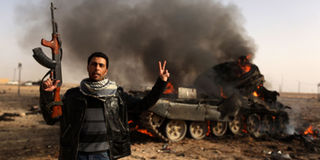Libya rebels see imminent victory, plan transition

A Libyan rebel flashes a V-sign in front of burning tank belonging to loyalist forces bombed by coalition air force in the town of Ajdabiya on March 26, 2011. Photo/AFP
Libya's rebels were pushing further on Wednesday to isolate Tripoli in what their leaders say is a decisive phase in a six-month civil war against Moamer Kadhafi they predict will end within weeks.
Anticipating that eventual victory, they also announced plans to turn over power to an elected assembly within eight months of Kadhafi's ouster and the drafting of a new constitution.
Further turning the screws on the regime, they moved toward a western town that links the capital and Sirte -- Kadhafi's hometown and a stronghold for his military.
"The scouting teams of the revolutionaries reached the outskirts of Al-Heisha after expelling Kadhafi forces," the rebel military command said early Wednesday.
Al-Heisha lies roughly 70 kilometres (45 miles) south of Misrata and 250 kilometres (150 miles) from Tripoli, near two key crossroads that link loyalist-held territory in the west with that in the oil-rich Sirte basin.
It was the latest in a series of operations to cut off the capital, which the rebels hope will force defections from the regime and spark a Tripoli uprising against the nearly 42-year-old regime.
Mansur Saif al-Nasr, the National Transitional Council (NTC) envoy to Paris, said on Tuesday that the rebels also had full control of Zawiyah, a vital oil port just west of Tripoli that links the capital with Tunisia.
"We are entering a decisive phase. We hope to celebrate the final victory at the same time as the end of (Muslim holy month of) Ramadan" at the end of August, he said.
But while rebels claimed to control "most" of Zawiyah, Kadhafi forces on Tuesday shelled the city, wounding several civilians, an AFP reporter witnessed.
Earlier in the week, a defiant Kadhafi predicted victory: "The end of the coloniser (NATO) is close and the end of the rats is close," he said in an audio message on Libyan television.
The regime has denied it is in danger, insisting that its forces can retake towns and districts captured by the rebels in past days.
In some parts of the country, Kadhafi's fighters showed little sign of acquiescing.
On Libya's eastern front, rebels admitted they had suffered relatively heavy losses battling loyalist forces around oil installations in the town of Brega.
"Since yesterday (Monday), we have had 15 victims on the Brega front," said spokesman Mohammed Zawiwa, adding the fighting was continuing in one of the town's residential areas.
As the fighting continues apace, the NTC announced a timetable for a democratic transition.
The council would move its headquarters from the rebel bastion of Benghazi in eastern Libya to the north African nation's historic capital in the west, Tripoli.
Within 30 days of that, it would appoint a transitional government, which would be tasked with organising within eight months of Kadhafi's departure the election of a 200-member transitional assembly.
It would appoint a prime minister within a month and form a committee that would draft a new constitution, which would be submitted to a referendum.
The assembly would draft an electoral law fixing the date of elections to be held before the end of six months.
These would be organised "transparently" and "democratically" in a process supervised by the United Nations and other international bodies.
The assembly would have 30 days to approve the results of the election and another 30 days to convene the new parliament, formally ending the transition period.
Meanwhile, NTC head Mustafa Abdel Jalil sought to encourage regime defections, promising a fair trial for some and amnesty for others.
But the invitation did not extend to Kadhafi and his closest allies, naming Kadhafi's son Seif al-Islam and intelligence chief Abdullah al-Senussi.
"Anyone who is accused, or has an (International Criminal Court) arrest warrant in his name will fall under international jurisdiction and we will not be able to accept immunity or amnesty for them."
Earlier this week, Kadhafi's Deputy Interior Minister Mabruk Abdallah flew from Tunisia to Egypt on a private plane with nine relatives, a Cairo airport, but it was not clear if he was defecting.
Regime spokesman Mussa Ibrahim said merely that he had gone to the Egyptian capital for "personal reasons."
Dozens of high-ranking officials have turned their back on Kadhafi since the pro-democracy uprising erupted, inspired by the so-called Arab Spring.
Abdel Jalil also ruled out negotiations with the regime and vowed a swift transfer of power once the veteran strongman is ousted.
He denied suggestions that members of the NTC had held talks in Tunisia with representatives of the Kadhafi regime.
"There are no negotiations, either direct or indirect, with the Kadhafi regime," said NTC chief Abdel Jalil.
Rebel officials acknowledged there were some Libyan figures taking part in the talks, but insisted that they did not represent Benghazi.




